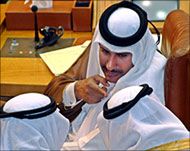No Arab alternative to US plan
Arab foreign ministers have adjourned a four-day meeting without producing a unified position outlining how to reform their societies.

The ministers meeting in Cairo had been expected to come up with an Arab response to the Bush administration’s strategy for reforming the Middle East.
The ministers “agreed to have further discussions on these ideas and plans,” said Moroccan Foreign Minister Muhammad Benaissa on Thursday after the meetings.
The ministers will discuss the issue again when they hold a final gathering in Tunisia just before an Arab leadership summit from 29-30 March.
However, none of the officials explained why the ministers were unable to forge a unified position. Arab League Secretary General Amr Musa described the reforms as daunting challenges.
Reform suggestions made included setting up an Arab Court of Justice to resolve inter-Arab disputes.
Western pressure
Arab nations, most of which are tightly controlled by kings, emirs or presidents for life, have come under pressure from the United States and Europe to open up their societies.
Several nations have been making some changes in recent years, including establishing parliaments and holding local elections.
 |
|
Qatari FM Shaikh Hamad bin |
The Bush administration is advocating an initiative modeled on the 1975 Helsinki pact that the West used to press for change in the Soviet Union and eastern Europe.
Aimed at the arc of countries extending from Morocco to Pakistan, it urges governments adopt major political and economic reforms and be more accountable on human rights issues.
The administration was planning to present the plan at the G8 summit of industrial nations in June.
No foreign influence, please
Arab nations, led by Egypt and Saudi Arabia, have denounced the initiative as an imposition of foreign ideas and interference in their internal affairs. They have pushed hard for Arabs to come up with a homegrown reform package.
On Wednesday, Qatari Foreign Minister Shaik Hamad bin Jassam bin Jabr al-Thani chided Arabs for rejecting the US proposal outright.
Musa repeatedly has said that Arabs cannot support the Bush administration’s new strategy unless the United States addresses the Palestinian-Israeli conflict and the war against Iraq.
Coordinating change
The ministers’ discussions focused on an Egyptian-Saudi initiative that encourages Arabs to play a larger role in running their political, economic, social and cultural affairs.
The initiative, also backed by Syria, suggests Arabs coordinate their foreign and security policies through new supervision and follow-up agencies.
The Egyptian-Saudi initiative does not include the status of women, human rights questions, how to upgrade education systems and opening up rigid political systems.
Still, regardless whether Arab foreign ministers are able to agree on and polish a plan, their leaders are expected to discuss reform initiatives at the Tunisia summit.
US-appointed interim Iraqi Foreign Minister Hoshyar Zebari, a Kurd, said he championed broad reform during the private ministerial meetings.
“The wind of change is blowing and Arabs should be prepared,” said Zebari.